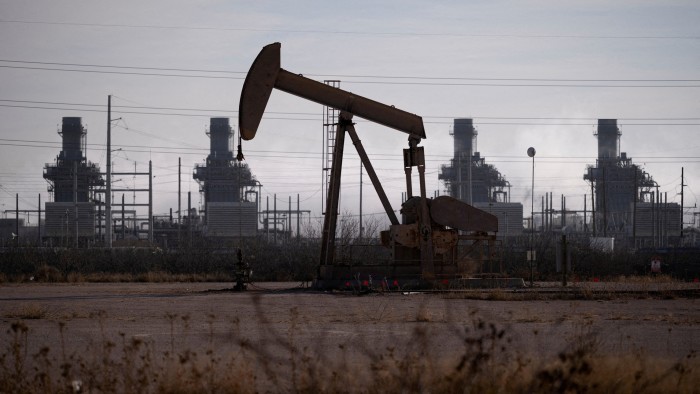Stay informed with free updates
Simply sign up to the Climate change myFT Digest — delivered directly to your inbox.
Global banks led by JPMorgan Chase, Citigroup and Bank of America boosted fossil fuel financing by more than one-fifth in 2024, in a major reversal of the trend of recent years, an annual report by climate campaigners found.
Coal, oil and gas finance provided by the world’s 65 largest banks by assets rose by $162bn to $869bn, according to the 16th report produced by a coalition of groups co-ordinated by the Rainforest Action Network, based on lending and underwriting data from more than 2,800 companies.
This marked the first time that the total value of fossil fuel funding failed to decline since 2021, the year when many banks announced their support for net zero targets at the UN COP26 climate summit in Glasgow.
The development coincides with US abandonment of the Paris Agreement on climate change in the second term of the Trump administration, and its aggressive pushback on green policies.
In the ranking, JPMorgan remained in lead position as the world’s biggest financier of fossil fuels after increasing its activities by more than a third to provide $53.5bn to the sector in 2024.
JPMorgan said it believed its own “data reflects our activities more comprehensively and accurately than estimates by third parties”. By its calculations, it provided $1.29 to green energy for every dollar backing high-carbon energy — a metric which had been requested by the New York City comptroller on behalf of pension funds.
The report found Barclays was Europe’s biggest financier of fossil fuels, boosting its activities by 55 per cent to $35.4bn.
The bank said it sought “to meet consumer and businesses energy needs while financing the scaling of clean energy”. It had “mobilised nearly $100bn more sustainable and transition finance” than the year before and continued to invest £500mn in climate tech start-ups by 2027, it added.
Bank of America and Citigroup also increased fossil fuel financing by more than $10bn each last year, to deliver $46bn and $44.7bn respectively.
Citi said it supported “the transition to a low-carbon economy”. It has committed to reaching net zero greenhouse gas financed emissions by 2050, and said it was working with clients on decarbonisation and clean energy.
“Our approach reflects the need to transition while also continuing to meet global needs for energy security, particularly in this time of increasing electricity demand,” the bank said.
Bank of America, which ranked second globally, declined to comment.
Chinese banks remained consistently the world’s biggest financiers of coal. “Backpedalling” by HSBC was described in the report, after changes to its fossil fuel exclusions policy. HSBC chief sustainability officer Céline Herweijer quit last year after being removed from the executive committee in a restructuring. The bank did not comment on the report.
Japanese banks ranked as big players in providing finance for the gas sector last year, led by Mizuho, which declined to comment.
Overall, however, big US banks remained dominant, committing one-third of global financing at $289bn in total last year. Merger and acquisition finance was a key driver after deals between gas producers, particularly involving the Permian Basin.
Many US banks have rolled back net zero targets in recent months under the Trump administration, with JPMorgan, Citigroup and Bank of America also all quitting the UN-backed Net-Zero Banking Alliance industry group.
“This year, banks have shown their true colours — many have walked away from climate commitments and doubled down on financing fossil fuel expansion, even as global temperatures break records,” said co-author of the report Lucie Pinson, director and founder of Reclaim Finance.
Climate Capital
Where climate change meets business, markets and politics. Explore the FT’s coverage here.
Are you curious about the FT’s environmental sustainability commitments? Find out more about our science-based targets here




